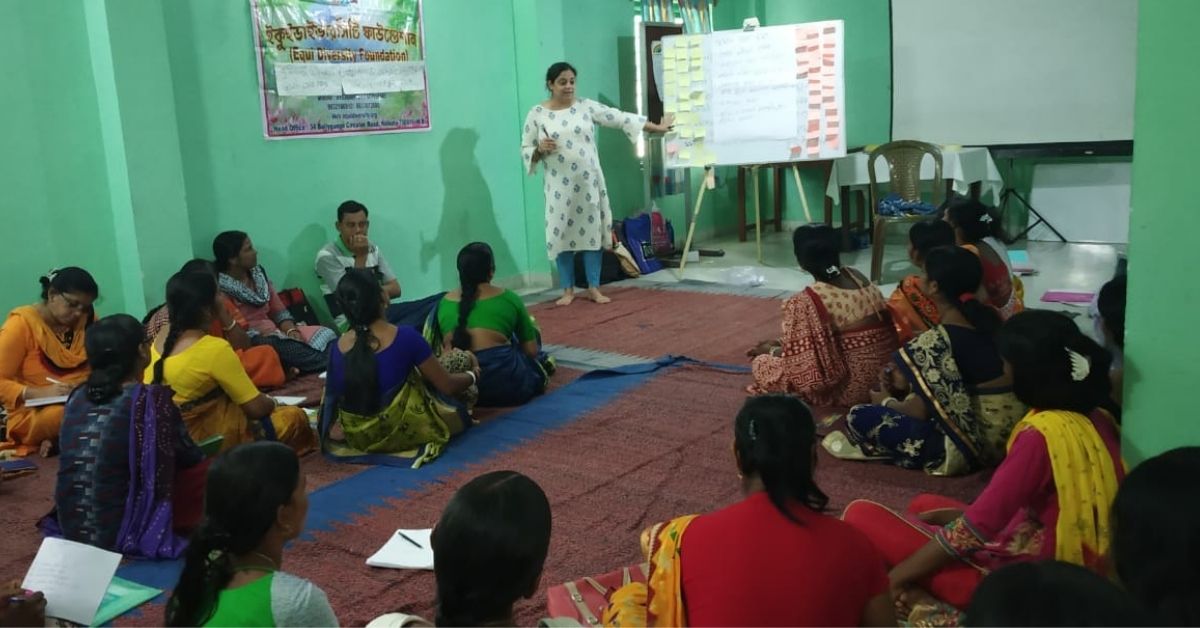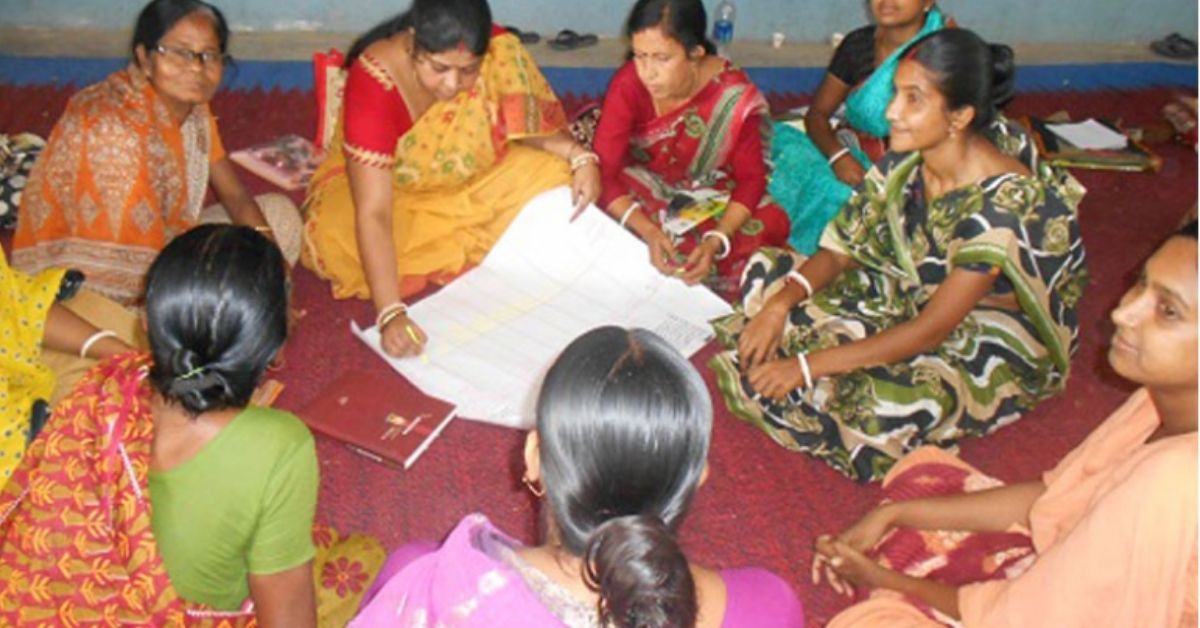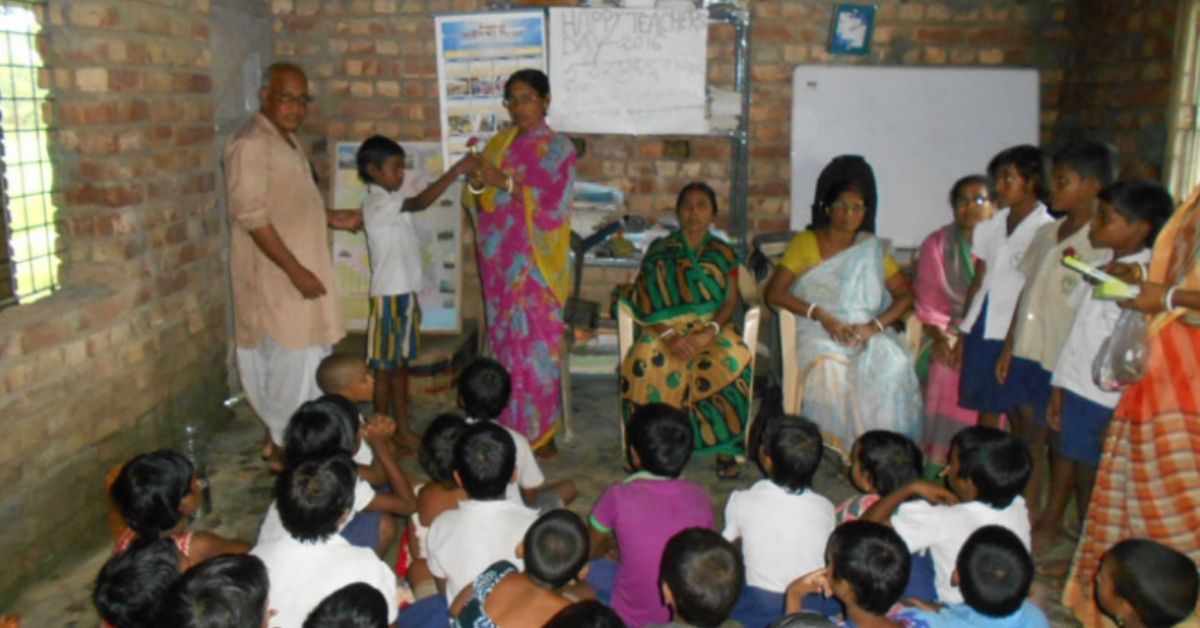In West Bengal’s South 24 Parganas district, 27-year-old Sonali Bajkhan Pradhan spent most of her days confined to her home. She occasionally offered voluntary services in her local gram panchayat during the implementation of government schemes. However, because she didn’t receive payment for her work, she’d return home every day to taunts from her father-in-law, who expected her to remain home and care for her children and husband. Moreover, she would watch helplessly as he, an alcoholic, would beat her mother-in-law regularly.
Like Sonali’s mother-in-law, many women in her village are plagued by regular abuse and deteriorating mental health. A lack of representatives in local governing bodies who could empathise meant that there was no real platform to voice their grievances.
While there’s much emphasis on women’s representation in Indian politics, many challenges hinder such empowerment — existing patriarchal notions, threat of sexual violence, and social stigma, to name a few. Meanwhile, at the Central level, India has seen many women leaders, but by the time we reach down to grassroot institutions, such as the panchayat, their representation dwindles.
In a bid to work against this phenomenon, West Bengal-based Equidiversity Foundation, founded by 45-year-old Anindita Majumdar, works to integrate women into local politics to ensure that they move past being mere figure heads to be empowered to move actual change.
The organisation has helped several women across the state, like Sonali, build a system that considers women an equal participant in India’s political landscape.
Today, Sonali works as a community leader with the foundation’s Nari Jagran Committee to take up the cases of women facing domestic violence subsequent mental health issues to, firstly, make women aware of their basic rights, and then to seek legal guidance and mental support. She has been able to empower her own mother-in-law to make informed decisions about her own rights, informed her father-in-law of the ramifications of his actions, and earn a decent livelihood for her family.
“Before joining the committee, I was not even aware of what the Constitution of India has laid down for women like my mother-in-law and I, and what rights we bear. After Equidiversity approached us, we were able to understand that we have the same freedom as men to choose the kind of lives we want,” Sonali tells The Better India.

Equidiversity was launched in 2016 to empower women with adequate rights and abilities of decision-making. As of now, it covers Purulia, Birbhum and the Sundarban areas, and is directly working with around 1,600 people. So far, Birbhum has seen 9 elected representatives, who have all been reelected this term. South 24 Parganas saw three re-elected members this term, and two new representatives from the Nari Jagran Committee.
How we can gain by supporting women
Born and brought up in Kolkata, Anindita has been working in the development sector and around issues pertaining to women empowerment for over 20 years. “As a woman, when you’re growing up, you understand pretty soon that you’re different — in the way that you are treated and looked at by society. For me, that came along with an understanding of my privilege, and the urge to make a difference,” she tells The Better India.
For around 12 years, Anindita worked as a caseworker for an organisation aimed at eradicating gender-based violence. However, her experience taught her that it was important to ensure that the local administration was held accountable in such cases, so that these issues could be addressed at their root. “I also understood that women needed to move beyond being proxy leaders,” she notes.
In 2017, Equidiversity conducted a short survey to understand the status of elected women representatives, and found that almost 65% had no income of their own and less than 4% were graduates. “Around 77% said they had faced some form of gender-based violence. Interestingly, around 64% told us they had filed their nominations because they were asked to do so by their husbands and political parties to reserve these seats, so they actually had no real interest in politics. Moreover, only 22% of them had previous experience in political leadership,” she notes.
Anindita adds that reservations for these seats are often rotated — so a seat reserved for a woman in one term may come to fall under the general category in the next. In these cases, the women go back to their old lives of being housewives.
Equidiversity works with these representatives to build their capacities, hand-hold them to make them understand their roles, along with helping them get in touch with their own gender trappings.
The organisation educates them about aspects such as budget-making, the workings of a panchayat, and laws available to them. “We also work with male elected officials and opinion leaders who tend to control the entire process to sensitise them to women. It’s a question of shared leadership and understanding how they can also gain by supporting women,” she adds.

The foundation also works with women voters. “The idea is not only to inspire new leaders among them, but also equip them with the awareness of the rights and responsibilities they have as voters. We teach them how to hold the panchayat accountable and to raise their grievances and issues with them. When we began working with these women and asked them about some problems they were facing, gender-based violence was among the top issues. Then came issues regarding income and livelihood. These women have then mobilised into Nari Jagran Committees,” she says.
The goal of these committees is to support the rights of women, provide support to survivors of violence, and help women engage with members of the panchayat. “There are sansad sabhas that are held where members of this committee hold discussions with panchayat members and form planning committees. Then we withdraw and Nari Jagran Committees hold up their own and lead the women of their communities,” Anindita says.
Building a robust democracy
Equidiversity also ensures the setting up of child parliaments in primary schools, and working with these children to enhance their life skills, empathy, values of democracy, and other such aspects. These schools now also have a platform for children to put in their grievances, which the elected prime minister will open up regularly to discuss. “Children can submit their problems anonymously and approach us later for counselling. Many issues have been raised — feelings of helplessness, alienation and loneliness, problems they face at home, being beat up by teachers, loss of loved ones, not having access to sanitation, quality of food in the school, and many such other issues,” she adds.
Anindita explains, “The average age for dropping out of schools and getting married for boys is around 19, while girls get married at 16. So girls become mothers by the time they’re 17, and the boys either join the unorganised sector or join local political outfits with skewed understandings of machismo. We want to work to provide them with a safe space to understand the ramifications of these and let out their inhibitions and take up issues. We encourage them to take up social causes. For example, some boys are running a community-led library to offer aid to students who have lost their access to academic material after [cyclone] Amphan and during the pandemic. They also formed theatre groups to spread awareness about sexual assault.”
Speaking of some challenges that they face, Anindita says, “Our organisation often falls into two categories — facilitating partnerships with the panchayats or working as an activist entity. These lines get blurred in cases where, say, there’s gender-based violence and the perpetrator is someone from the local governing body. Moreover, we’re ultimately a small organisation that struggles a lot with funding — we rely mostly on small and individual donations. There are many unresolved issues that the people we work with, particularly the youth, face, so tackling them all can be a challenge.”

Other changes that Equidiversity has brought about include setting up of nutrition gardens led by women and children in various homes that have produced over 14,000 kilos of vegetables in 2020.
During the pandemic, and natural calamities such as cyclone Amphan, the foundation partnered with many groups to provide relief work and aid to over 6,000 people. The team handled around 100 cases of gender-based violence, increased applications of disability certificates, housing schemes, installation of boundaries around girls’ schools, public toilets, renovation of playgrounds, and setting up of COVID isolation centres.
Meanwhile, Sonali, who has now worked with around 30 children with disabilities to give them a better life, says, “This work has given me love and respect in a manner that my family has never given me. Now that I am earning, I feel more empowered to make decisions and raise my voice. As women, we have a right to be open about our wants and needs, and that is something that working with the foundation has taught me.”
Edited by Yoshita Rao
No comments:
Post a Comment